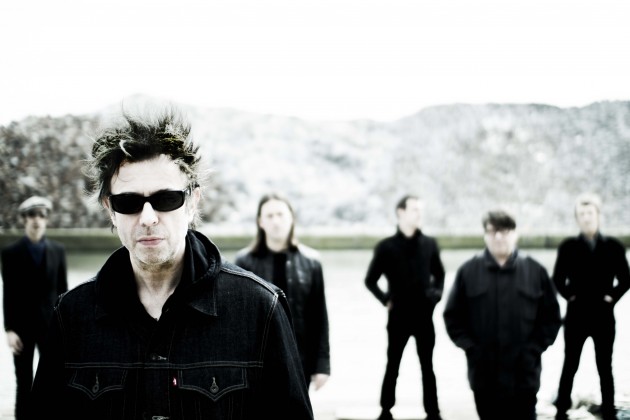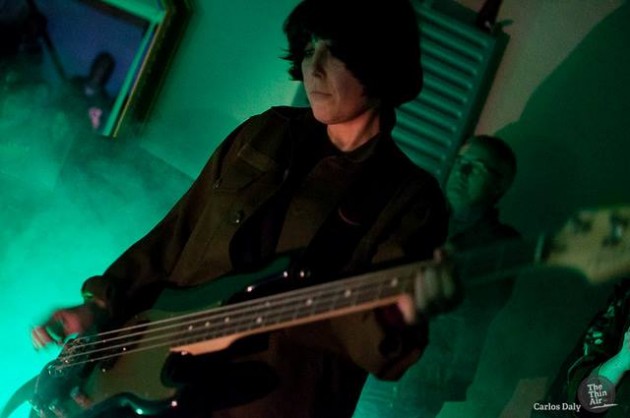For one glorious moment, Echo & The Bunnymen stood on the precipice of the world, and it seemed like Mythic Glory was theirs for the taking. Then they had an extended holiday, released a commercial sell-out album, and broke up. About ten years later, they found themselves in a similar position, at the forefront of perhaps the most spectacular comeback in pop history, Doing it Clean. But what happened in the next fifteen years? “I know the reality of life, and where we are in the world. I’m not an idiot, you know,” Will Sergeant tells Steven Rainey.
More than most bands, Echo and the Bunnymen are perfectly placed to feel the burden of history. Their debut, Crocodiles, is arguably the first truly great debut of the 80s, and their subsequent three albums charted their rise from post-punk darlings, to bona fide popstars. When the press adverts for 1984’s Ocean Rain proclaimed it “THE GREATEST ALBUM EVER MADE”, it didn’t entirely seem like an idle boast.
But after capturing this mercurial dark magic, the band unravelled in a short space of time, 1987’s Echo and The Bunnymen (or The Grey Album, as fans took to calling it) discarding enigma and mystique in favour of lumpy production, and attempts at radio hits in America. Frontman Ian (Mac) McCullough, quit, whilst guitarist Will Sergeant led the band on for one more album before calling it quits.
But the old magic refused to stay dead, and after making an album together under the name of Electrafixion, Sergeant and McCullough found themselves playing Bunnymen songs to Bunnymen fans, in a band which featured half of Echo and the Bunnymen. The next step seemed inevitable.
The hurdle in reforming the Bunnymen, however, was the untimely death of drummer Pete DeFreitas in 1989 at the age of 27, a motorbike accident bringing his own unhinged rock and roll odyssey to an end. But the call was made to bassist Les Pattinson, songs were worked on, and the old magic was rekindled. Evergreen was released in 1997, simultaneously brought the Bunnymen back into the mainstream, whilst making it look like they’d never been away. Liam Gallagher sang backing vocals on ‘Nothing Lasts Forever’, and the whole thing looked like something from a movie script, with even the cover harking back to the classic picture on Crocodiles.
The following years saw them release five more studio albums, the most recent of which, Meteorites, was released last year to warm reviews. Not ecstatic ones, mind.
“I wasn’t that involved with it, to tell you the truth. Mac wrote all them songs, and he did it with Youth (producer, and one-time bassist of Killing Joke). I was kind of put on later, it was a bit weird,” mumbles Will Sergeant as he sits audibly sipping tea down the phone. Now in his mid-50s, the sullen, occasionally spiky character of yore has been left behind in favour of a whimsical charm that finds him very much at peace with his role in the nature of the cosmos. “But things are changing now, we’re back writing together, doing things the way we used to, the old way of doing things. I felt a bit weird on that one, to tell you the truth. What I did do, I was happy with, but I would have liked to be a bit more involved. But that’s the way it’s gone back to now.”
Certainly, Meteorites lacked that snapping tension that Sergeant’s best work provides, but to all extents and purposes it re-established The Bunnymen as being capable of writing tight, contemporary guitar rock, with one eye clearly on the mainstream again. But then again, is the mainstream necessarily looking back at them?
“Them (first four) albums were for us the most important, in a way. I don’t think, “Yeah, this next album is going to be received with us being the next big thing!” It’ll be received with people listening to it, and some of it will be good, and some of it won’t be so good.”
Previous albums like The Fountainhead and Siberia certainly had their fair share of both categories, but increasingly it’s on the live stage that The Bunnymen are testing their mettle. Throughout all the line-up changes, and the ebb and flow of their commercial fortunes, that core duo of Mac and Will have managed to keep the fireworks erupting when they’re in front of an audience. Old traditions like incorporating bits of other songs, surprises from the vaults, and raucous guitar explosions are still very much on the agenda, with the delight of the band still clear for all to see.
“We do a few new ones off the new album, but mainly the old ones, really. We know what our fans want, and we give them what they want. We have no worries doing that.” Sergeant says this almost as if it ain’t no thang, but given the number of ‘new’ records the band have under their belt since the 90s reformation, surely they’d be contractually obliged to ‘treat’ us to more than a few songs from the latest bit of product?
“When I go and see a band and they play the new stuff, I don’t enjoy it as much as ones that I know. It’s just the way it is! I don’t have a problem with it, it’s the only chance I get to hear them anyway. It’s not like I’m sitting at home playing them all the time. We’ve started doing ‘Ocean Rain’ again, we haven’t done that one for ages. It’s like meeting an old friend. But it’s the crowd reaction that keeps it going. I mean, are you going to sit there and do your new jazz-funk odyssey for 20 minutes? No, they’re all bored by that point! It’s self-indulgent rubbish.”
In a sense, this refreshing self-awareness has always been a part of The Bunnymen’s charm. Right from the moment they’d exploded onto the music scene with their classic debut single back in ’79, the band has seemingly always known how they wanted to be taken, and how they want to be remembered.
“I’m looking for us to have a classic legacy, like the Doors or the Kinks, and I think we’re getting there. I know a lot of people have a Bunnymen album in their collection, even if they nicked it off the internet.”
A crucial, and often overlooked, part of that legacy can be found in the archives of the ‘inkies’, the weekly music press that dominated the UK music scene in the 80s when The Bunnymen were at their peak. Even if you’d never heard one note of music by them, the frequently hilarious interviews the band conducted added considerable clout to their claim for greatness. Equal parts biting and incisive, Mac in particular was known for his potshots at contemporaries, describing U2 as “Music for bricklayers” and Bono as a “mountain goat”, Boy George as a “mincing fat git”, and claiming that ‘Paul Weller’ was a rubbish name for a singer. Almost as bad as ‘The Jam’, or ‘The Style Council’, apparently.
“It was weird, because everybody was after us,” he says with a smirk. “I was a bit snotty with a lot of interviewers. I was young and foolish, but that added to the mystique. And definitely Mac was snotty. But we were coming out of punk, and you knew people were after you, and you didn’t want to give it to them. I had a job then, I was a chef, working right beside the Zoo Records office. I used to go over and help Bill Drummond (Bunnymen manager, and one half of the KLF) post the records when we were becoming this hip thing after getting single of the week for ‘Pictures on My Wall’. I’d be there, posting them off to people in Cornwall or wherever, and I started to feel really uneasy about it, because they could have been complete divvies. I mean, they could have been real dicks!”
Presumably, this isn’t quite as big a concern as it once was.
Whilst Echo and the Bunnymen might not possess that unquantifiable sense of ‘greatness’ anymore, they’ve certainly earned their stripes, and have crafted a legacy that is amongst the most stunning in post-punk history. And in no uncertain terms, when they take to the stage, you know that they’re more than aware of their place in the great canon of rock and roll history. True to form, Will Sergeant puts it a little more succinctly.
“What am I most proud of? The first four. Bits of the Grey Album. Evergreen and bits of Siberia. But you never know what’s around the corner.” Steven Rainey
Echo and the Bunnymen play Belfast’s Mandela Hall on February 17 and Dublin’s Olympia Theatre on February 18.
Win tickets to the Belfast show here.






